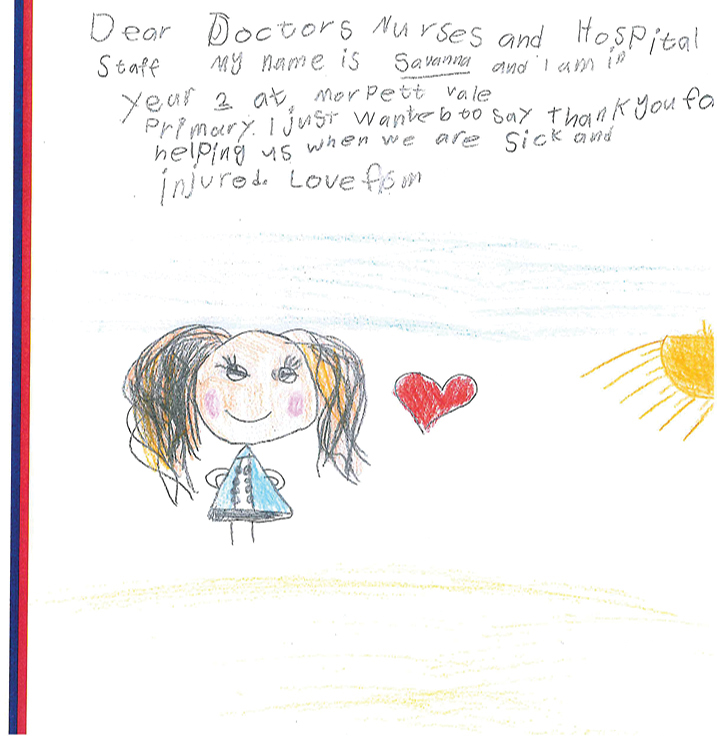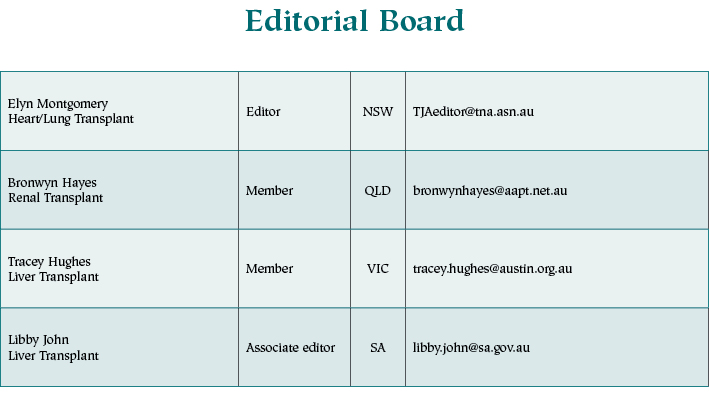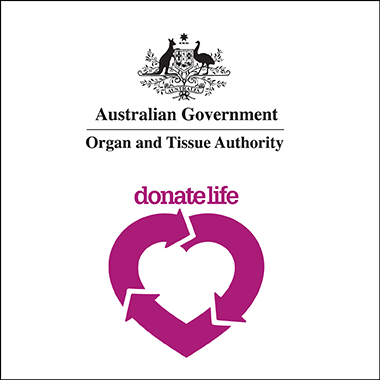Volume 29 Number 1
Global Transplant Community
Libby John
For referencing John L. Editorial. Transplant Journal of Australasia 2020; 29(1):3-5.
DOI https://doi.org/10.33235/tja.29.1.3-5

I would like to begin this April Editorial with a welcome as well as a goodbye. Firstly, congratulations and a warm welcome to our incoming TJA editor Elyn Montgomery. Elyn brings a wealth of knowledge to the role, with over 15 years of clinical experience in the UK and Australia (with a background in cardiopulmonary transplantation), authorship of many publications, and ongoing contributions as a peer reviewer to a high profile nursing journal. Elyn currently holds an academic position with the Faculty of Health at the University of Technology Sydney.
As we welcome Elyn, we say goodbye to outgoing TJA editor Myra Serrano who has completed two appointments as TJA editor over many years. Myra has worked quietly and tirelessly behind the scenes to ensure three quality TJA editions are published each year. Myra has also overseen the conversion of the hard copy TJA to the electronic version which has increased our ability to distribute the TJA to members as well as decrease production costs. Myra’s professionalism and academic ability has been invaluable and we thank her for her commitment and contribution to TJA and the Transplant Nurses’ Association (TNA). We wish her well for her new career pathway.
It is both ironic and pertinent that this TJA edition has an international focus, highlighting the global community that the transplant sector has formed. Sadly, as I write this editorial, the global transplant community and international healthcare professionals are fighting this unprecedented COVID-19 pandemic. It is an incredibly challenging time as so many lives have been lost, including those of doctors and nurses trying so hard to save their patients. We should acknowledge the dedication and bravery of these healthcare workers as well as all the emergency services and other support workers, both overseas and in our own country.
The extent of the impact of COVID-19 on our organ donation and transplant sector in Australia and New Zealand is yet to be fully realised as daily assessments are made regarding rates of infection and the availability of hospital resources. Minimising risk to our pre- and post-transplant patients as well as staff is paramount, and information emerging from China, Europe and the USA regarding patient outcomes will help guide our clinical decision-making. Through the Transplantation Society, the international transplant community from over 20 countries have shared regional reports describing their experience with the COVID-19 crisis; this will help inform planning and practice for those yet to experience the peak of the disease burden1. This forum of international exchange, as well as regular advice and practice recommendations from The Transplantation Society of Australia and New Zealand (TSANZ)2, is vital to our local transplant units as we face uncertain times ahead.
Nurses are playing an important role around the world as well as in Australia and New Zealand during the COVID-19 outbreak. The TNA is also committed to supporting transplant nurses and our patients. We are collaborating with TSANZ and Transplant Australia to ensure practical information is developed and received by frontline nurses and patients – see tna.asn.au, www.tsanz.com.au and www.transplant.org.au for updates. I have been impressed with how quickly transplant nurses / coordinators have adapted practices and implemented measures to minimise risk to their patients and ensure their safety. The information, advice and reassurance they have given and continue to give to their patient group is invaluable.
The international collaboration theme of this journal is reflected in several of the articles, starting with Dr David Gracey’s Guest Editorial discussing the support given by NSW units to transplant services in Zimbabwe. Nurse practitioner Kathy Kable, also from NSW, provides a report on the international study tour she undertook as the recipient of the 2019 Astellas Practice and Development Travel Award. This award enabled Kathy to attend the American Transplant Congress and the Transplant Infectious Disease Symposium in Boston USA last year. She also attended meetings with international leaders in the field of transplant infectious disease and frailty, as well as undertaking a clinical attachment at the University of Pittsburgh Medical Centre Abdominal Transplant Unit. Kathy was able to explore research opportunities with her international colleagues as well as observe clinical practice in transplant nursing, particularly the transplant nurse practitioner role. Her article also provides us with an excellent summary of some of the exciting work currently being undertaken in the international transplant community in the areas of CMV disease, influenza vaccination, BK viremia and nephropathy and pre-transplant frailty assessment.
An article by liver transplant recipient Jennie provides inspiration for us all as well as validation of how precious the gift of organ donation is. Jennie has embraced life since her liver transplant and has enthusiastically pursued the opportunity to travel around the world by competing in the Transplant Games. She has fond memories and a network of friends in many countries whom she has met during her travels. She encourages other transplant recipients to benefit from “getting involved, making friendships that will last years, and just ‘having a go’”.
Susan Virtue’s article describes a global health epidemic of another kind – that of obesity. It is a significant health issue worldwide, including Australia, where rates of cirrhosis and hepatocellular cancer due to fatty liver disease are increasing. This has resulted in fatty liver disease becoming one of the leading causes for liver transplantation in Australia and New Zealand. Due to the risk of recurrent disease post-liver transplant, bariatric surgery may need to be considered at the time of transplant to prevent harmful weight gain postoperatively. Her article describes the introduction of a programme in NSW where simultaneous sleeve gastrectomy may be performed in selected cases. The authors describe the potential benefits as well as the challenges of this surgery.
I hope you enjoy this ‘global transplant community’ themed edition of the TJA. I would like to conclude by highlighting how important it is at this stressful time to look after our own emotional and mental wellbeing as well as our physical health. Take some time to focus on the positives that emerge from the barrage of sobering COVID-19 news that is constantly circulating. Smile and be grateful for the acts of kindness that become evident during this time. I was moved by the lovely letters my hospital received from local primary school students thanking the hospital staff for the work they were doing to keep people safe. Likewise the anonymous messages of love and support and cheerful drawings in colourful chalk that I came across on the footpath outside a locked down aged care facility near my house. Conversely, while keeping us all physically apart, this virus is also bringing us closer together as a community in other ways.
Stay safe and well and here’s hoping we are on the downside of ‘the curve’ before too long.

Letter from a primary school student to local hospital staff

Author(s)
Libby John,
TJA Deputy Editor and
TNA National President-Elect
References
- The Transplantation Society. Global transplantation Covid report March 2020; 2020 [cited 2020 Mar 30]. Available from: https://tts.org/14-tts/transplantation/696-tts-txj-covid-19.
- The Transplantation Society of Australia and New Zealand. COVID-19 updates; 2020 [cited 2020 Apr 3]. Available from: www.tsanz.com.au.



